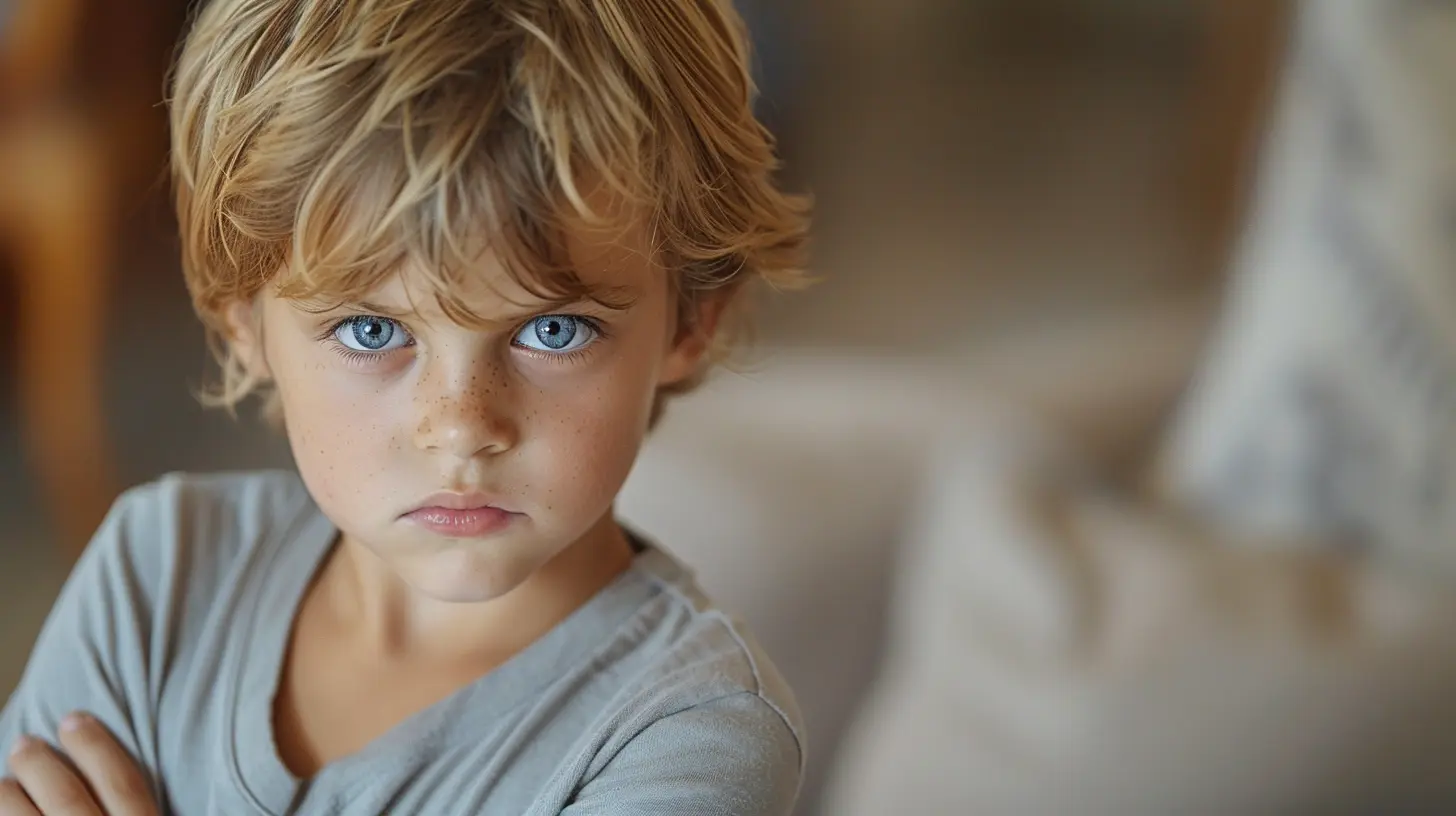Raising Respectful Kids: The Role of Boundaries
22 December 2024
Parenting is one of those jobs where you're constantly learning on the go. Just when you think you've nailed it, your child hits a new phase, and boom—you’re back to square one. One of the most critical areas parents grapple with is ensuring their kids grow into respectful, well-rounded individuals. It sounds simple, right? Teach them to say, "please" and "thank you," and you’re done. But here’s the catch: Respect is a lot more complicated than that, and boundaries play a massive role in shaping it.
In this article, we’re going to explore how setting boundaries can help raise respectful kids. Not the "don’t-touch-that" or "no-running-in-the-house" kind (though those are important too), but the deeper, emotional and behavioral boundaries that teach kids essential life values. Let's dive in!

Why Boundaries Are Vital for Raising Respectful Kids
Setting boundaries is like laying down the foundation for a house. Without a solid base, the whole thing falls apart. Kids need clear limits to understand how to behave, how to treat others, and most importantly, how to respect themselves and the world around them.But here's the thing: Boundaries aren't walls. You’re not trapping your child in a cage—you’re guiding them on how to navigate life effectively. Healthy boundaries help children feel safe and give them a framework for understanding what's expected of them.
Respect Is a Two-Way Street
Before we jump into how boundaries create respect, let’s break down respect itself. Respect isn’t something that can be demanded; it’s earned. And it’s not a one-way street, either. You can’t ask your child to respect others if you aren’t modeling that same behavior.Kids are like little sponges—they absorb everything. If they see you respecting others and maintaining healthy boundaries in your relationships, they’re more likely to adopt that same behavior. On the flip side, if you don't set boundaries, they may struggle with respecting themselves and those around them.

What Are Boundaries?
Let’s clear up any confusion first. Boundaries aren’t just rules, like "no yelling" or "no hitting." While rules are important, boundaries go a bit deeper. They are the invisible lines that define acceptable behavior, both for ourselves and in our interactions with others. It’s about understanding where "I" end and "you" begin.Boundaries help kids understand concepts like:
- Personal space (everyone has a bubble, and it’s crucial to respect it)
- Emotional boundaries (it’s okay to feel sad, mad, or frustrated, but can't vent those feelings in harmful ways)
- Social boundaries (understanding when to speak, listen, or give someone else a turn)
By teaching these invisible lines, you empower your child to respect not only others but also themselves. It's like installing a moral GPS that helps guide their interactions.

Setting Boundaries Without Being Overbearing
One of the biggest challenges is finding the balance between giving your child freedom and setting boundaries that feel like prison walls. How do you set limits without micromanaging or making them feel stifled? Glad you asked.Be Clear and Consistent
Kids thrive on consistency, even if they pretend to hate it. If you set a boundary but continually let them slide, guess what? They’ll start to push all your other limits, too. It’s like giving them an inch and then watching them run a mile.The boundaries need to be super clear. For instance, if bedtime is 8 p.m., make sure it’s always 8 p.m.—not 8:30 some nights and 7:30 on others. Consistency isn't just about driving home the message; it’s also about fostering a sense of security.
Use Positive Reinforcement
Setting boundaries doesn’t always need to involve punishment. In fact, positive reinforcement can be an incredibly effective tool. When your child respects a boundary, make sure to acknowledge it. This doesn't mean buying them a toy every time they listen, but something as simple as, "I noticed you listened when I asked you to stop yelling earlier. That was very respectful of you." These little moments add up.Allow for Open Conversations
While we want our kids to respect the boundaries we set, it’s also vital that they understand why those boundaries exist. Encourage open discussions about family rules and boundaries.For example, you might say, "We don’t interrupt when someone else is speaking because it’s rude and it shows we respect the other person’s thoughts." This helps kids not just follow rules blindly but appreciate the value behind them.
Be a Role Model
Remember that whole “monkey see, monkey do” thing? It’s no joke. If you expect your child to respect boundaries, you have to do the same. How do you handle it when someone cuts you off in traffic or when a coworker says something out of line? Your kids are always watching, and how you react to others plays a big role in their understanding of respect.If you yell every time something doesn't go your way, don’t be surprised when your child adopts the same approach.

Establishing Respect for Themselves Through Boundaries
Teaching your child to respect others is critical, but don’t forget the importance of self-respect. Healthy boundaries help kids understand their own worth. By knowing when to say “no” and recognizing when it’s okay to walk away from a situation, they learn to value themselves.Teach Them to Set Their Own Boundaries
Yes, parents need to set boundaries, but it’s just as important for kids to learn how to set their own. Help them understand that they have the right to say “no” if someone is invading their space, asking them to do something they’re uncomfortable with, or crossing emotional boundaries.For example, if your child feels uncomfortable with a friend constantly asking them for favors, coach them through how to politely yet assertively set boundaries, like, “I can’t help you today. Maybe another time.”
Encouraging this type of self-awareness not only instills respect but also fosters a healthy sense of autonomy and confidence.
Model Emotional Regulation
Kids are still learning to manage their emotions and responses. They need to understand that while all their feelings are valid, not all actions that stem from those feelings are acceptable. For example, it’s okay to feel angry, but hitting someone is not.Teach emotional boundaries by modeling how to regulate your own emotions. When you're upset, instead of snapping at them (or someone else), try saying, “I’m feeling frustrated, so I’m going to take a few minutes to calm down.” This shows your child that it's okay to have feelings, but there are respectful ways to handle them.
Why Boundaries Create a Safe Environment
Contrary to popular belief, children actually crave boundaries. They give structure and predictability in an otherwise chaotic world. Boundaries help kids understand what’s expected of them, what’s okay, and what’s not. Most importantly, they give a sense of security.Without boundaries, kids may feel aimless, unsure, or overwhelmed. It’s like hiking without a trail—you might make it to your destination, but the road will be a lot longer and more difficult.
Boundaries Prevent Overwhelm
Too much freedom, too soon, can be overwhelming for children. They need boundaries to help break things down into manageable pieces. It’s like giving them the guardrails they need to keep from veering off the path.For example, when you limit screen time, you’re not just being a killjoy (even though it might feel that way to them). You’re protecting their mental health, creating time for other activities, and teaching them the value of balance.
The Long-Term Impact of Setting Boundaries
Setting boundaries isn’t just about the here and now. It’s about raising kids to be respectful adults who understand the importance of mutual respect in all their relationships, whether it’s with friends, coworkers, or romantic partners.Children who grow up with healthy boundaries tend to have better self-esteem, are more empathetic, and are better equipped to handle life’s challenges. They respect others’ boundaries, and equally important, they expect others to respect theirs.
By setting these boundaries early, you're not just teaching them how to behave now; you're giving them tools that will last their entire lives.
Final Thoughts
Raising respectful kids isn’t just about teaching them manners; it's about helping them understand the role of boundaries in fostering respect—for themselves and others. It’s not always an easy task, and let’s be honest, there will be days when it feels like an uphill battle. But the effort is worth it.Set clear, consistent, and healthy boundaries. Model the respect you want to see in them. And most importantly, give your kids the tools they need to navigate their world with confidence, kindness, and integrity.
After all, we’re not just raising kids—we’re raising future adults.
all images in this post were generated using AI tools
Category:
Parenting BoundariesAuthor:

Noah Sawyer
Discussion
rate this article
12 comments
Rosanna Griffin
This article piqued my interest! I'm curious about how setting boundaries can shape a child's understanding of respect. What are some effective strategies for parents to implement these boundaries without stifling a child's independence? I'd love to hear more insights on this!
February 11, 2025 at 4:13 AM

Noah Sawyer
Thank you for your interest! Effective strategies include open communication, involving children in discussions about boundaries, and consistently reinforcing limits while allowing them choices within those boundaries. This helps them learn respect while still fostering independence. I’d be happy to share more insights if you're interested!
Phaedra Fuller
Setting boundaries teaches love and respect—your kids will thank you later! Keep it up!
January 29, 2025 at 3:31 AM

Noah Sawyer
Thank you for your insightful comment! Establishing boundaries is indeed crucial for fostering respect and healthy relationships in children.
Gianna McDonald
Setting boundaries is essential for teaching respect; it's a loving way to guide our children’s behavior.
January 23, 2025 at 4:42 AM

Noah Sawyer
Absolutely! Boundaries provide clear expectations and teach children the importance of respect, fostering healthy relationships and positive behavior.
Talis Whitley
Establishing boundaries is not merely about discipline; it's an invitation for children to understand their own limits and respect others. By modeling respectful behavior and consistently reinforcing these boundaries, we empower our children to navigate relationships with empathy, fostering a generation of thoughtful, compassionate individuals.
January 17, 2025 at 3:59 AM

Noah Sawyer
Absolutely! Establishing boundaries not only teaches discipline but also nurtures empathy and respect in children, paving the way for compassionate relationships. Thank you for highlighting this important aspect!
Lilith Hahn
Setting boundaries with kids is like herding cats—chaotic, amusing, and definitely messy! But hey, if they can learn not to use the dog as a trampoline, there’s hope for respectful humans in the future. Just keep a sense of humor (and maybe a few treats) handy!
January 13, 2025 at 3:39 PM

Noah Sawyer
Absolutely! Embracing the chaos with humor and patience is key. It makes the journey of setting boundaries with kids both challenging and rewarding!
Payton Reynolds
Boundaries are like guardrails on a rollercoaster—keeping the ride thrilling yet safe! With a sprinkle of love and consistency, we can raise respectful kids who know how to navigate the ups and downs of life!
January 10, 2025 at 3:31 PM

Noah Sawyer
Absolutely! Boundaries provide essential structure while allowing children to explore and grow. With love and consistency, we empower them to understand respect and responsibility.
Isaac Wood
Establishing boundaries is essential for raising respectful kids. Consistent rules teach children accountability and respect for themselves and others. By modeling assertiveness and empathy, we empower our children to navigate relationships with confidence. Let’s commit to setting clear boundaries for a stronger foundation in their growth.
January 5, 2025 at 3:42 PM

Noah Sawyer
I completely agree! Clear boundaries are vital in teaching children respect and accountability, fostering their ability to build healthy relationships. Thank you for highlighting this important aspect of parenting!
Fallon James
Establishing clear boundaries is essential for teaching kids respect. It helps them understand limits and fosters healthy relationships, both now and in the future.
December 30, 2024 at 4:52 PM

Noah Sawyer
Absolutely! Clear boundaries are crucial in teaching children respect and helping them navigate relationships effectively.
Adria Mullen
Great insights! Establishing boundaries is essential for teaching respect. Your tips will definitely help parents create a positive environment. Thank you!
December 28, 2024 at 4:19 PM

Noah Sawyer
Thank you for your kind words! I'm glad you found the tips helpful for fostering respect in kids.
Uriel Monroe
Oh sure, just sprinkle a little ‘boundary fairy dust’ and voilà! Instant respect! Who knew parenting was this easy? Maybe I’ll just set up a boundary around my sanity while I’m at it. Because, clearly, that’s the real challenge in all this!
December 27, 2024 at 4:34 PM

Noah Sawyer
I totally understand! Establishing boundaries can seem daunting, but they’re essential for both kids and parents. It’s a journey, not a magic fix!
Jet Roth
Setting boundaries is like teaching kids the art of polite fencing—it's all about giving them space to thrive while keeping the occasional sword fight at bay. Remember, respectful kids today make for delightful dinner guests tomorrow!
December 27, 2024 at 4:01 AM

Noah Sawyer
Absolutely! Setting boundaries equips kids with essential social skills, helping them navigate relationships while fostering respect and consideration.
Arwen McWilliams
Setting boundaries is essential for nurturing respect in our children. It’s a challenging journey, but your efforts truly shape their future. You’re doing great!
December 24, 2024 at 5:27 AM

Noah Sawyer
Thank you for your kind words! Establishing boundaries is indeed vital for fostering respect, and I appreciate your support on this important journey.
MORE POSTS

Promoting Positive Behavior in Children with Challenging Diagnoses

Building Social Skills for a Smooth School Transition

Encouraging Your Son to Build Friendships Based on Trust and Respect

Newborn Milestones: What to Look for in the First Month

Defining Success: How Dads Can Redefine Achievement in Career and Parenting

How to Handle Working Mom Guilt and Thrive in Both Roles

Navigating the Emotional Rollercoaster of Parenting

Creating a Peaceful Morning Routine for Parents Who Work